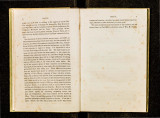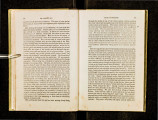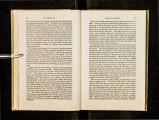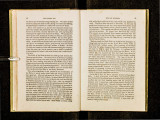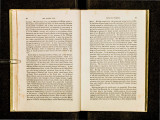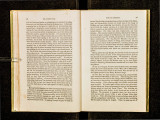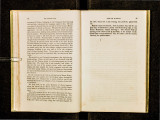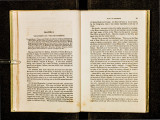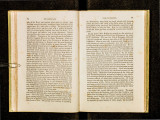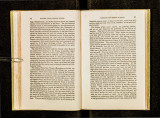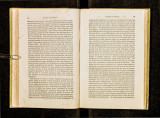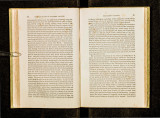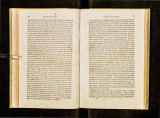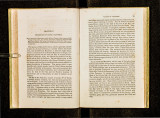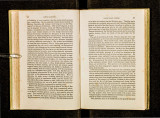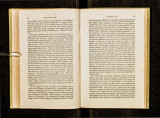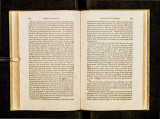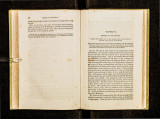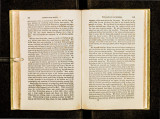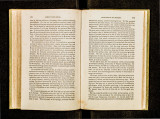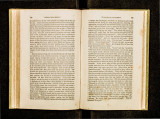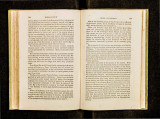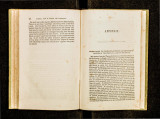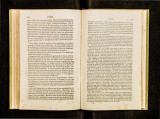| OCR Text |
Show THE JOURNEY OUT, side of the River, one hundred miles above its mouth. The buildings occupied as stores, \Varchouses, shops, residences of tho agents, men, &c., make quite a villa<rc. The around back for hal~~ ·~ile, is level; and then rises, wlth a gradual inclina;ion, unt1l1· th 1 s elevated scvcrn.l hundred feet above the Rivc 1• • It · lS set w.1t grass, and makes a very pretty appearance. Vessels draw1~g fifteen feet water, ascend the Columbia this far, without any d1fficulty. Vancouver is the principal depot of the Hudson's Bay Fu1· Company, West of the Rocky Mountains. Their furs ar~ collected fl'Om all pa1·ts of the Territory, to this place, and sh~pped once every year, to England; and the v es~cl roturninobrmgs, annually, a cargo of goods, to supply the trade. The~ kee.p constantly on hand, one ycat·'s supply in advance, that if any ncc1dent should happen to the vessel, eithct· 011 her outward or homeward bound passage, the trade might not be intcrruptcd.-The Company ha vc some good farms, and several lar o·c herds of cda t·t le and hogs, in different places · They 11 n.ve an° extenst·v e au·~, on Sophia's Island, at the rnouth of the Willammctte ; w~ete they ma~w, ann~ally, several thousand pounds of butter and cheese. Which tl e cl t s· I N . . ' . 1 y sen o tt en, a Russian settlement, to tho otth, Wlth whtch tile Hudson's Bay Cornparly I l ~ . 1uvc a so a con-tract to llll'lllsh a large amount of wheat yc·l t·ly ln t r 1 · 1 . ' " • re urn 101' twh eH cS 1 , tdh e·y arc to recctv.e the Russian furs' • 'fllc' y 1'1 . f . h 1 \.CWISO Ul'lllS · an Wd lfCi h1 Islands, W. lth a considerable amount of {] ou r I b Lll'IJ e r spais, an ls 1; for whtch they rece ive, in return the' . d ' of those Southern Islands. T bc rrrcat design f ~h. Cpl o ucts is to trade with tl)o Indians and ~l·c tl , b ·. o ts ompany, a · 1 r ' \. 10 caver; but after this mma 'so unJortunatc on account of the' .· ·1 d. 1 '. . . clenc h · · . 1101 less w 11ch Provt-e as gt ven It, as a shwld against the cold of theN . h h d become nearly extinct~ in the lower valle of Ol ~ ' a after the settlcmetlt <)f 1r<o l·c·l rrners . y tho Columbta; and '11 the S d .,. ' I citizens of the United St t ~ o' ... an W!Cll slands, and a es lD re rron bt'a' n t they extended th · . b ' ·bu o create . markets ou· operntwns, and b"rran to 1 . h ' raise cattle to b 'ld ·u '"'n cu tlvatc t e soil, to merchandiz~, and t:~ tr:dto s, :tohf~rni.sh the settlers with articles of . . w 1 !Ol'otgn ports. Havmg obtamed a skiff at the For . went down the Rivers· . 'I t, belongmg to Oregon City, we mette. The lower molXthml cs, to ~he upper mouth of the Willam-b l u comes mto the Col b' . c ow, makina Sophia's I 1 d T . urn lU twenty mtles West side ofbthe River. 8 : 1 : ••• h~ hills are very high on the dense forests of Pine. Weuh l~se ~ ~a~ually,.a~ldarc covered with a but ·ltttle dJfJtculty in ascending WITH ITS INCIDENTS. tho Willammottc, there being not much current until we came within one and a half miles of the Falls, where we found a strong Rapid, at the junction of the Clackamus; a small, but rapid River, coming in from the East. Here we were obliged to get out into the water, aml draw our boat by a .cord, several hundred yards. Ila\ ing passed these Rapids, we arrived, in a few minutes, at Oregon City, situated at the Falls of the Willammette, the place of ouL' destination. This was the 13th of November, 1843, and it was five months and nineteen days after we left Independence, in Missouri. Here we were able to procul'e such things as were really necessary to make us comfor table ; and, what was most espec1ally pleasing to us, an abundance of substantial food. vVe enjoycd that plenty which, until now, we had long been strangers to; and were happy, after along and tedious tour, .ov ~ r mountains and deserts, through a wild and savage wilderness, to witness, upon these distant shores, the home of Civilization : To see houses, farms, mills, store-houses, shops ; to hear the busy hum of indus .. try; the noise of the workman's hammer; the sound of the woodman's axe; the crash ot the falling pin es ; and to enjoy the warm wclcomo of countrymen and friends. Ilow grateful these circum· stances were to us, he who has never passed the bounds of Civilization , or forsaken the parental roof, can never know. We had been here but a short time, before the last of the Emigrants arrived. They were soon scattered over the country. Those who intended to cuttivate the soil, laid claims, built cabins, and prepared for the coming winter. Mecl)anics found employment at the Fulls, and those who had no particular occupation, Ol' object in view, distributed themselves through the country, taking hold of whatever cir· cumstanccs oflered, or suited their inclinations best. All found enough ~o do, and there was in the country, an abundance of the JCal necessaries of life. Every one seemed satisfied, for a time, "ith being permitted to have a home and a plentiful subsistence.And notwithstanding many were greatly exposed, during the winter season, all were blessed with excellent health. Our arrival had a great effect upon the country. The people were beginning to feel lonesome, and to fear that it would pe long before these far distant wilds of Western America, would be settled. Property ·was of doubtful value, and thei1· once high anticipations were fading away. They had heard repo1·ts from the Indians, ot the app1·oach of a g1·eat number of white people; but the 1·eports \ |







